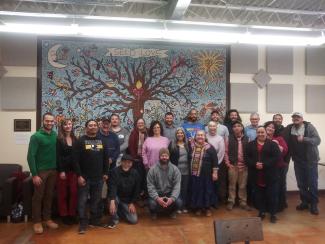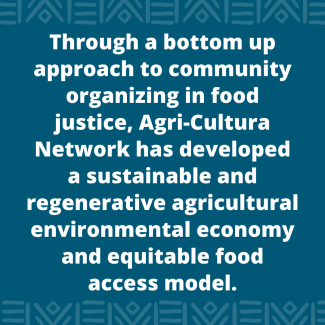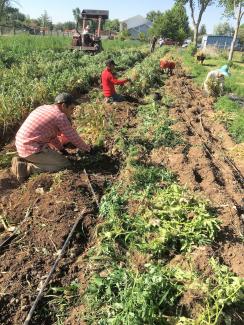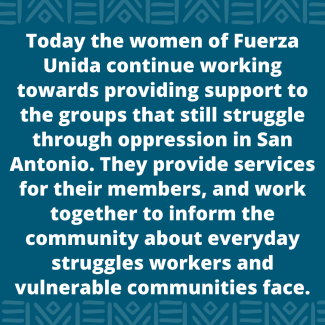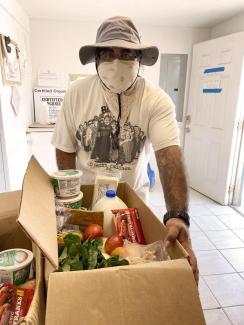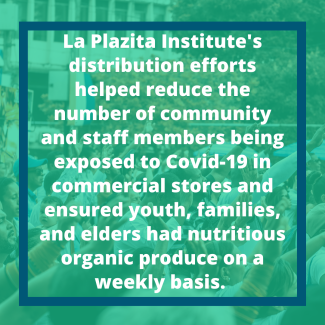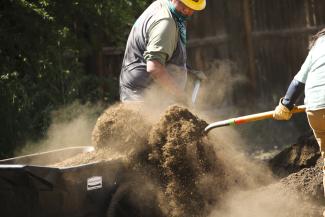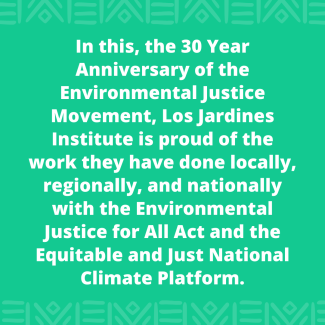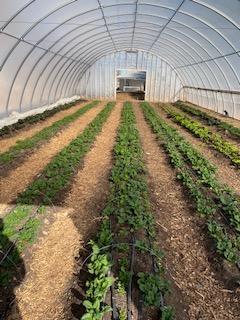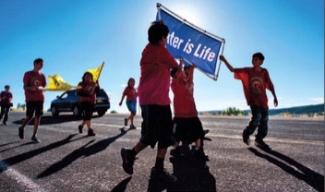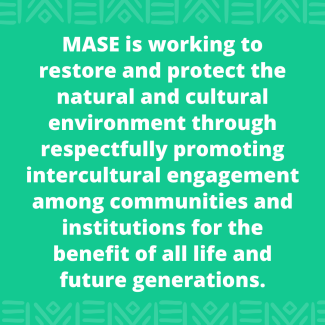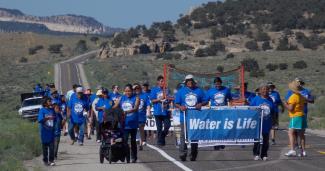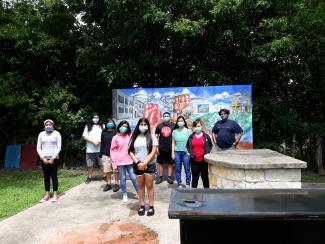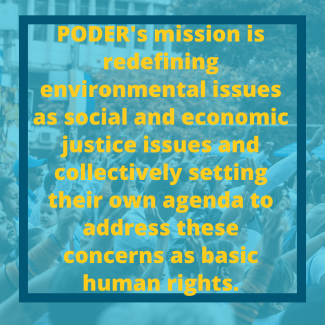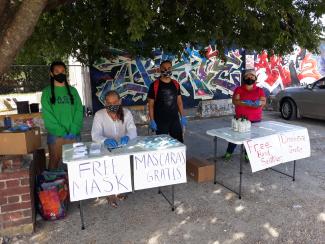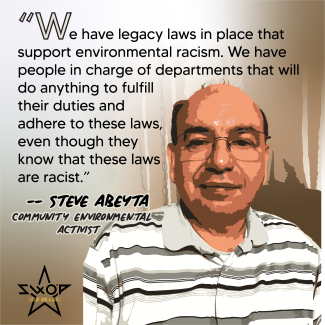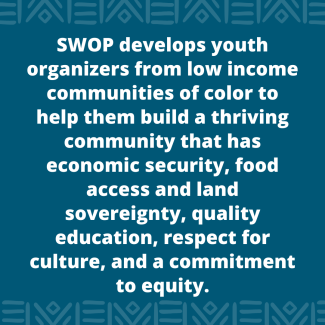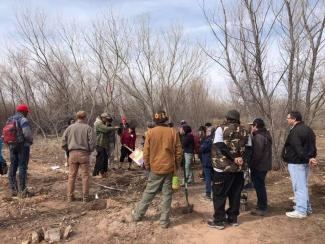2020 Southwest Spotlight Series
We are highlighting the dynamic work of 2020 BEA Fund grantees as part of a multimedia series that will include written features sent to our listserv, social media and here on the website.
Read about our BEA Fund Grantee Spotlight organizations below.
- Agri-Cultura Network (ACN)
-
The Agri-Cultura Network (ACN) of Albuquerque, NM provides access to local produce to promote nutrition and economic development through traditional and innovative agricultural practices, therefore furthering environmental and community stewardship to strengthen the agrarian and cultural heritage of their land and its residents. Through a bottom up approach to community organizing in food justice they have developed a sustainable and regenerative agricultural environmental economy and equitable food access model. Small scale urban and rural traditional BIPOC farmers have been the drivers in developing effective strategy that build farmers capacity to grow food through organic methods and keep production local.
In 2020 Executive Director Helga Garza was voted as Chair of the New Mexico Food & Agricultural Policy Council as the first Native woman of color to chair this prestigious and powerful council in New Mexico. The farm to market production and distribution manager Anita Aldaje became a USDA GAP (Good Agricultural Practice) harmonized auditor for the state of New Mexico, making her one of two GAP auditors in the state and the only woman of color.
Even with all of the challenges of a global pandemic in 2020, ACN and their equitable food distribution expanded to reach marginalized Native Pueblos and Native Reservations. They also expanded to the southeastern part of New Mexico to reach communities of color in Ft. Sumner, Clovis and Portales as well as expanded to the southern part of the state in Silver City and Mimbres. ACN and the food access program La Cosecha also developed shelf stable value added production developing and distributing shelf stable with a health focus on low-sodium and diabetic friendly food products. ACN continued to make progress in their collective efforts with partners on the Dollar Store Campaign in their efforts in chemical policy reform with Dollar General. ACN also worked to steer Dollar General stores in the South Valley and International District to stock local fresh produce and shelf stable products and expand this project at a statewide level. Dollar General stores are the only stores available for many of our urban and rural frontline communities and ACN is holding them accountable to providing healthy and safe packaging, healthy food access, and to build wealth in the communities they profit from.
- Fuerza Unida
-
Fuerza Unida’s mission is to empower women workers, particularly women workers of color, and their families to achieve social, economic and environmental justice through education, organizing and advocacy in San Antonio, TX. Fuerza Unida works to advance the rights of these people by providing education, training, guidance, and accessible information. A special part of Fuerza Unida’s story is their work addressing issues confronting garment workers who faced economic crisis because of plant closings and layoffs. Today the women of Fuerza Unida continue working towards providing support to the groups that still struggle through oppression in San Antonio. They provide services for their members, and work together to inform the community about everyday struggles workers and vulnerable communities face.
Fuerza Unida was aware of challenges and oppressions their communities faced before Covid-19 and understood the reality that these were exacerbated, not "revealed" by the pandemic as was the analysis of the media and politicians. Their members include women who are leaders in their own right who often work in the background of Fuerza Unida's efforts. They were able to step in as active representatives of the organization to make survey calls and connect with other members to provide the support their peers needed.
Fuerza Unida's efforts have persisted through various Covid-19 related challenges. They successfully maintained consistent support to their communities in accessing food and emotional support during uniquely hard times. Fuerza Unida was able to stay present and engaged with their members, supporters, and volunteers during a time when other support systems failed. Their staff's open communication and trust allowed them to adjust to changing work spaces. They successfully produced a new product -face masks- in order to inform and provide support to their communities in their efforts to protect themselves and family and friends from Covid-19.
- La Plazita Institute, Inc. (LPI)
-
La Plazita Institute, Inc. (LPI) mission is using a comprehensive, holistic and cultural approach designed around the philosophy of “La Cultura Cura”, to engage with youth, elders and communities to draw from their own roots and histories that will express core traditional values of respect, honor, love, and family in Albuquerque, NM.
LPI is proud of the food distribution efforts accomplished during the pandemic. The organization distributed hundreds of food boxes to community members for free. These distribution efforts helped reduce the number of community and staff members being exposed to Covid-19 in commercial stores and ensured youth, families, and elders had nutritious organic produce on a weekly basis. The flexibility from funders was a key factor in supporting these efforts. This helped LPI turn the organic produce grown on the organization’s farm and garden plots into resources for everyone in the community, including staff and LPI Board members. Without resources and flexibility with the use of funds, the organization would not have been able to distribute food to the community for free. There was an undefinable medicine in the ability to be an impactful resource to the community LPI serves. Additionally, the organization is happy to report that production numbers increased during the majority of the growing season.
Having access to land and water throughout this past year had the greatest impact of all. If LPI wouldn't have had their farm and garden plots, the mental, physical, and spiritual health of the community wouldn't be where it is right now. It saved a lot of community members, staff included, during tumultuous times brought on by the pandemic and everyday living. Through efforts this past year, LPI Institute learned more about the brilliance within all of us; how our community is collectively and collaboratively resilient. Despite the pandemic, our community came together to thrive in a new way.
- Los Jardines Institute (LJI)
-
The work of the founders of Los Jardines Institute (LJI) spans over 70 years of social, environmental and economic justice organizing, education and building a multi-generational movement in New Mexico specifically in Albuquerque but in other parts of the state as well. LJI has been a primarily volunteer-run organization that supports itself through projects and grassroots fundraising. LJI’s Agricultural Project runs a small farm and is part of a Coop that seeks to support food justice and a space for an outdoor agricultural classroom. The program provides on the job training hosting two women farm apprentices, space for service learning, community gatherings, and educational activities.
LJI co-founded the Environmental Justice Health Alliance (EJHA), a national alliance of EJ grassroots organizations. These organizations in a partnership with Coming Clean have developed a strategic relationship to reform the chemical and energy industries so that they are no longer a source of harm. Their work with Local Food Solutions and their Dollar Store campaigns have assisted LJI through our Farmers Coop in building a regenerative economy.
In this, the 30 Year Anniversary of the Environmental Justice Movement, LJI is proud of the work they have done locally, regionally, and nationally with the Environmental Justice for All Act and the Equitable and Just National Climate Platform. They have also been involved with Biden's administration transition and current administration team meetings with: the Department of Justice, the Department of Agriculture, the EPA, Health and Human Services, the Department of Interior, and the Council for Environmental Quality. This work in particular has assisted in centering environmental and economic justice in the new administration. Locally they are working on building a local coalition to work on a cumulative impacts policy in the city of Albuquerque and in discussions to build a state-wide coalition for the implementation of Justice 40 at the state level. It is up to all of us to build a just sustainable grassroots movement from the bottom up.
- Multicultural Alliance for a Safe Environment (MASE)
-
The Multicultural Alliance for a Safe Environment (MASE) envisions respectful, peaceful communities cherishing a healthy environment. MASE is rooted in the experiences of uranium-impacted communities of the southwestern U.S and is based in the western part of New Mexico from the Laguna and Acoma Pueblos to Navajo Nation. They are working to restore and protect the natural and cultural environment through respectfully promoting intercultural engagement among communities and institutions for the benefit of all life and future generations.
MASE is moving forward with their work addressing cleanup at the Homestake Barrick-Gold Uranium Mill Superfund site with Federal agencies (EPA and NRC). In addition, MASE and their sister organization Amigos Bravos are holding regular conference calls about the standards for closure of the Mt. Taylor Mine. They have a mining expert that is working with them to ensure the shaft is closed and can't be reopened, protect groundwater, limit the size of the on-site disposal cell, and examine plans to sell water rights from the site to the Acoma Pueblo for future use.
During Covid-19, the move to online communications has been particularly difficult for Indigenous members. They often don't have access to long distance phone service nor internet connections. However, during this past year, as it has become more common for meetings to be virtual, they are learning how to get their grassroots members into hearings, webinars, and meetings. They are participating in more events and rotating speakers to increase skills and experience. Earlier in 2021 they joined a radio show on the Radiation Exposure Compensation Act (RECA) with Kansas City Peaceworks and presented RECA in a webinar for Beyond the Bomb with over 250 young people. They are working to expand and extend RECA by July 2022 to provide much needed compensation to all uranium workers. They are expanding the base of people learning about their issues and by sharing presentation opportunities, and they continue to develop leadership skills.
- People Organized for the Defense of Earth and her Resources
(PODER Austin) -
PODER (People Organized in Defense of Earth and Her Resources) is a women led, people of color grassroots social justice organization formed in 1991 to increase the participation of residents of East Austin in corporate and government decisions related to economic development and environmental hazards, and the impact these have on our communities. Their mission is redefining environmental issues as social and economic justice issues and collectively setting their own agenda to address these concerns as basic human rights. We seek to empower our communities through education advocacy and action.
National sentiment on racism and equity have enlightened many diverse groups to work together. It has also made many policy makers shift to the importance of equity in work and in society. The year's long work on the City's Climate Equity Plan has included equity for the first time since climate plans have been developed. Not only was equity included in the plan, but people of color were also hired as staff and as consultants. Having a large group of people of color working with mainstream environmental groups along with city staff on the City's Community Climate Equity Plan was a great success. The Climate Equity Plan also made history by including “Land Acknowledgement”. Acknowledging that the land we meet on belongs to the traditional territory of numerous indigenous peoples. Land Acknowledgements also aim to raise awareness and disseminate knowledge about indigenous histories that are so often forgotten and silenced. The discussion of equity and the national movement to address racism and equity was a major factor that has shifted policy development.
PODER further developed its program for high school students, Young Scholars for Justice (YSJ). This has a focus on climate health equity and is very rewarding and beneficial to their communities. The YSJ developed videos (posted on PODER’s website) on alternatives to chemicals and making homemade sanitizers, which addressed the lack of access to sanitizers due to Covid-19. During the pandemic, PODER had to provide masks and develop educational materials for the community. PODER created an outreach plan, targeting low-income apartments and mobile home parks. This effort brought many volunteers to the organization. These crises unified their organization and helped deepen relations with other groups.
- Southwest Organizing Project (SWOP)
-
The mission of Southwest Organizing Project (SWOP), NM, is to “empower disenfranchised communities in the Southwest United States to realize racial and gender equality and social and economic justice.” True change is achieved when communities identify problems, and solutions, in their community and have the knowledge and support to act on them. To SWOP, this means creating intergenerational spaces for in-depth conversations of structural racism and the root causes of inequity, in addition to designing policy solutions by first acknowledging our shared racist, colonial past. SWOP develops youth organizers from low income communities of color to help them build a thriving community that has economic security, food access and land sovereignty, quality education, respect for culture, and a commitment to equity.
SWOP’s key to base building and grassroots community development is ensuring that they stay accessible to community members who are experiencing social injustices and create pathways to engage with them around the issues they face. In addition, they build up their skills and leadership via workshops and trainings. They also use social media and produced media to uplift community solutions, and always make sure that the community members they organize with are a part of planning and strategy conversations.
This type of work has been a little harder to do during the Covid-19 pandemic, but with the help of SWOP’s community organizers, they have still been able to host online meetings with community members, as well as digital town halls that uplift the community voice in real time. They also have continued to have SWOP’s quarterly membership meetings, which have been well attended and engaging. Despite the limitations that the Covid-19 pandemic put on SWOP's environmental justice organizing efforts; they were still able to help community pass a cumulative impacts ordinance, work with community to stop water grabs by industry and developers, and continued to empower community leaders with the skills and resources they need to improve their community's quality of life.
